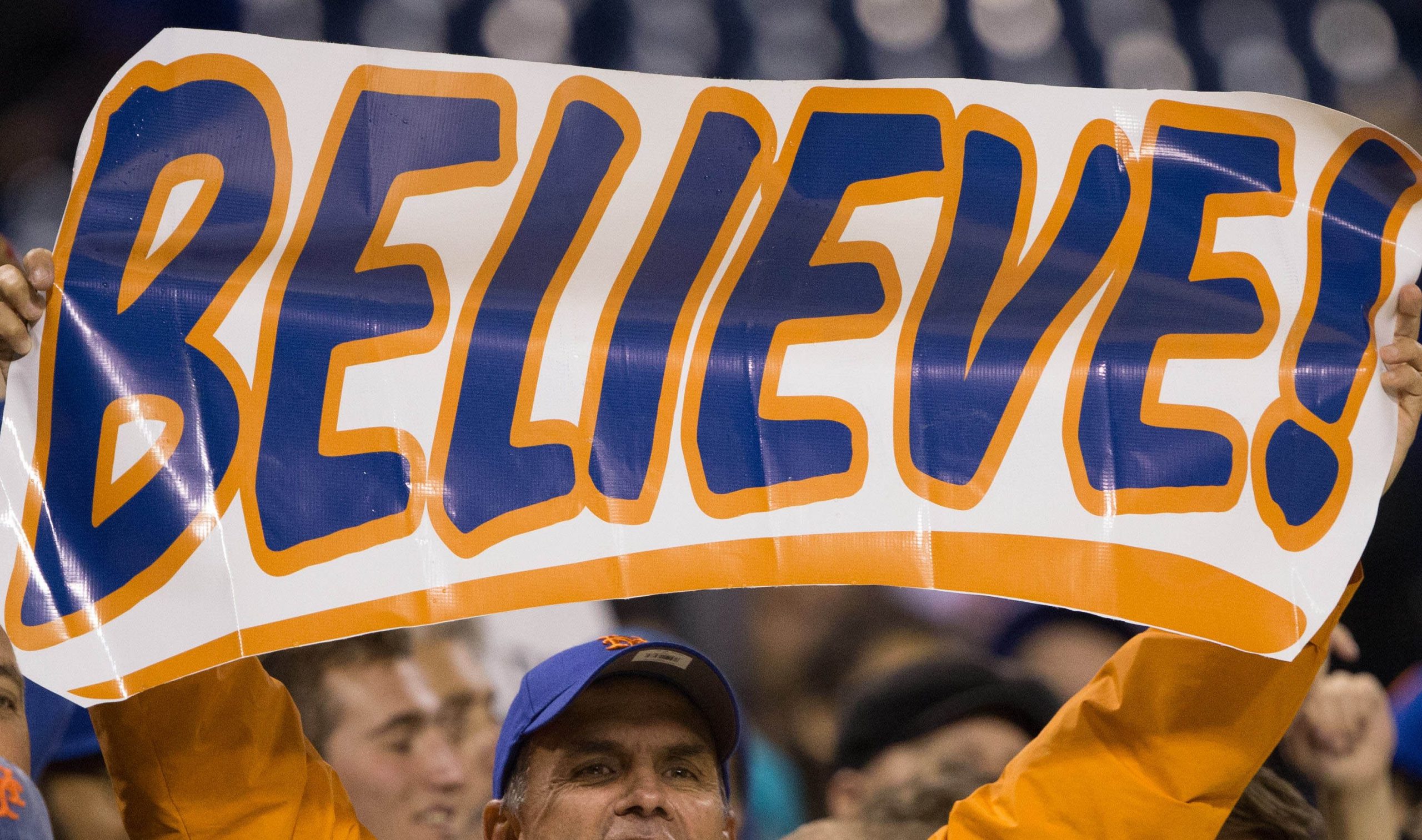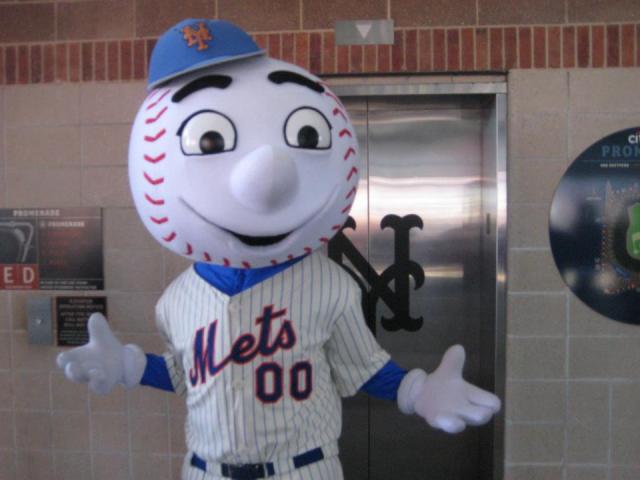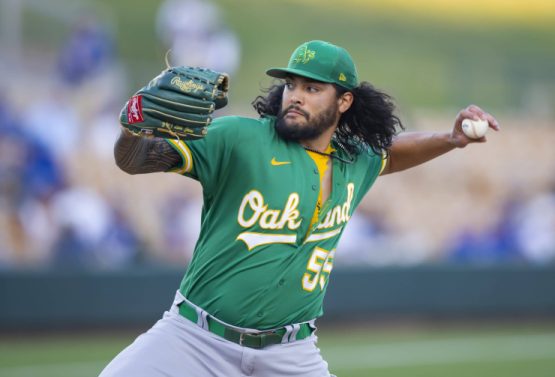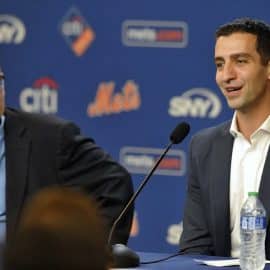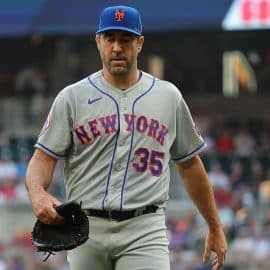It’s not zimmo to be a Wilpon right now.
The Yankees have acquired Giancarlo Stanton, will probably acquire Gerrit Cole, and the Mets are plagued with the same things that have plagued them for years: forced austerity, disorganization, and nobody being on the same page. To quote Ray Liotta in Goodfellas: “These are the bad times.”
It’s gotten to the point where fans are starting to organize boycotts of the Mets because they’re tired of the Wilpons, and their nonsense is starting to be called out. Why do you think Fred and Jeff signed off on the Cespedes trade, the Cespedes option, and the Cespedes contract? Because when the heat starts to turn up on them, they do something good for the team that placates the fan base and then when they have enough people defending them and whoever their general manager is at the time, they go away and put the rest of their money in their mattress. It’s something they’ve done over and over again. It was Jason Bay in 2010. It was Curtis Granderson in 2014. Then Cespedes in 2015 which they fell ass-backwards into after the Carlos Gomez trade fell through and the crest of dissatisfaction was bubbling to a boil, reaching its crest during the 2016-17 off-season where Cespedes was re-signed (after Jay Bruce’s option was picked up in the anticipation of Cespedes leaving). Then, satisfied for now, we all went away.
Here’s the thing about boycotts: I wish they worked. I can’t find any documentation of it, but I remember clear as day when Pirates fans, who had had enough of their team being in the gutter even after building a jewel of a ballpark, tried to organize a mass walk-out during the third inning of a random game in the middle of the season. In theory, everyone in the ballpark would walk out of a game in protest, the television coverage would notice this, footage would have been beamed out and distributed all over the country making this a huge news story as well as an important sports story. Then, ownership would have had to answer to that somehow, and the victory would have been the acknowledgement by ownership that fans were unhappy. I was really curious to see what would happen because if it had worked, it would have produced a lasting effect all around baseball.
If I remember correctly, ten people walked out. It was a huge bust that convinced me that boycotts don’t work. Convincing people who paid, say, $33 for a ticket to take two thirds of that and waste it to drive home during the third inning is really, really difficult. You’re asking people to waste money that has already been spent. You’re also asking them to take two hours that they would normally spend watching baseball and spend it in traffic. That’s a tough sell. Any variation of asking fans to either waste money or not spend it watching baseball, especially if they absolutely love baseball, is a really tough sell. For me personally, knowing that I’m going to be at a baseball game on a Saturday gets me through my Monday-Friday. Being at baseball games during the summer fills me with enough memories to get me through January and February when it’s 22 degrees and it’s impossible to leave the house. For me, as I’m sure it is for other people, that’s a lot to give up in the name of getting the Wilpons to take as much care of their baseball teams as they did about their real estate holdings. My $1,000, and even the thousand dollars of a thousand other people is a drop in the bucket to the Wilpons who make money through their other lives and through whatever revenue sharing they are able to take advantage of.
That’s not to say a boycott has to be pointless, because I don’t think the other alternative is any good either. That alternative, brought up by some, seems to be “well why not just root for another team if rooting for the Mets doesn’t make you happy?” That seems a little bit too logical for me. Not to mention the fact that I don’t think the Wilpons would care one way or the other about that either. I want to be a Mets fan who just wants my team to be its best self. I was alive when they were their best and think that could happen again.
I would never abandon a team because they lose more than they win. If I did that I’d be a front-runner and to be honest, I don’t have much trust for front-runners, in sports and in life. They’re not people I’d want to surround myself with. Now, if a Mets fan were to abandon them because their ownership treats them with contempt and blames them for the team’s troubles because they didn’t show up, and they do it through their mouthpiece (which right now is Sandy Alderson), then I would have more of an understanding of that.
Part of the problem, to me, is the notion of owners treating their teams like businesses or brands. I get it … you can’t own a team and act like a fan of the team 100% of the time. Teams aren’t just teams, they are organizations, and they have to be marketed like brands in today’s climate. The world changes and we have to change with it. But to have no consideration for the people that do treat these teams like teams will make you seem tone-deaf, and that’s a common complaint that fans have against the Wilpons. When many fans wear Mets gear (and this goes for most sports franchises), they do it because they are Mets fans and because they wear their hearts on their chests. But when the Yankees went from sports franchise to “brand”, they sold merchandise to people who are just wearing the brand, and then become fans through the brand. Some sports franchises can do this. The Packers, Steelers, Lakers, they can do this. The Mets can’t. But it’s almost as if they try to go that backwards route too often and forget that the best way to create a brand is to win. This isn’t like buying, say, an Eddie Bauer or Old Navy shirt and allowing yourself to be a walking billboard for that company and attract consumers to buy Eddie Bauer or Old Navy gear. Nobody is going to be attracted to the Mets because they see somebody wearing a Mets shirt. They’re going to be attracted to the Mets because they see them on television because they’re in a Mets fan family. But they’re going to be hooked to the Mets because they win. Winning is sustainable. But brand management style combined with austerity makes mediocrity an easy out.
But for as much complaining that we have done about the Wilpons, there really isn’t anything that can be done … maybe. the question becomes this: What’s the end game? Do you want them to sell? Or do you want them to change their modus operandi and start spending some real money to help the baseball team? Whichever option you want has a small chance of happening. But it can happen. There’s only one way this can happen through any sort of boycott or fan protest. And this is extremely important:
Get the media involved, and get them involved now.
Fans on twitter have been demanding that the Mets beat guys press more about the spending habits and finances of the Wilpons. It’s finally starting to happen. I don’t know what prompted Newsday’s Marc Carig, who has done some work with SNY’s pre-game shows and WOR’s broadcasts last season, to write the scathing article that he did about the Wilpons on December 16th. It could have been Sandy Alderson’s “I would spend a little less time thinking about our payroll” comment from December 12th. But whatever the reason, it seems to have sparked something in the media. Joel Sherman started thinking about the Mets’ payroll. Mike Puma wrote about Fred Wilpon being pissed about the Yankees. Then Fred re-hired Omar Minaya as a “special assistant”. Maybe Fred had the team’s best interests at heart, and really thought that Minaya, when put in a position of strength, could thrive. But even at best, it’s a dicey move to bring in the old GM to work for the new GM at a time when the new GM is dealing with a slashed payroll and a barren farm system. And Carig was all over this one as well:
Omar Minaya returning to Mets as a special assistant to the GM is an example of Fred Wilpon’s fingerprints being all over a move. Per a source, Fred Wilpon made this decision despite some serious reservations from the front office.
— Marc Carig (@MarcCarig) December 22, 2017
So, how is Fred Wilpon’s decision to hire his ex-GM to work with his current GM playing within the Mets organization? From one official: “In the baseball world, Fred believes the world is flat.”
— Marc Carig (@MarcCarig) December 22, 2017
Fred Wilpon owns the Mets. It’s obviously his prerogative to hire who he wants. But what are the chances that he actually addresses why he’s made a controversial move that has angered people currently working for him? The answer: slim to none.
— Marc Carig (@MarcCarig) December 22, 2017
IMO the dysfunction in this has nothing to do with Omar Minaya’s qualifications. He’s obviously qualified. It has everything to do with an owner — Fred Wilpon — forcing a move that he knew would anger the people who are running the team now. It’s more questionable management.
— Marc Carig (@MarcCarig) December 22, 2017
Words I’ve heard from Mets people today regarding Fred Wilpon’s decision to bring back Omar Minaya despite reservations within the current front office:
“embarrassing”
“stupid”
“undermining”
“insulting"
— Marc Carig (@MarcCarig) December 22, 2017
On top of all this came the story that former Met Ed Kranepool, an important personality in the early seasons of the New York Mets, was shunned by Jeffy because of a comment about the merits of his ownership.
How then can a player who is truly Mets royalty, who was playing for Casey Stengel when he was just 17 years old, end up on the outs with the franchise?
According to Jay Horwitz, the Mets’ longtime spokesman, the trouble stems from a remark that Kranepool made perhaps five or six years ago to Jeff Wilpon, the Mets’ chief operating officer and the son of Fred Wilpon, the team’s principal owner.
The remark, Horwitz said, came during an annual team dinner and apparently occurred during the period when the Mets, under serious financial pressure because of their involvement in the Bernard Madoff fraud scheme, were looking to recruit investors to buy a minority stake in the club.
As Horwitz tells it, “Ed approached Jeff in front of a lot of people and said, ‘I hear you are selling shares in your team.”’
And then, according to Horwitz, Kranepool added: “I don’t want shares. I want to buy the whole team so I can run it better than you and your father.”’
Asked about that remark, Kranepool remembered the exchange somewhat differently. Kranepool’s name had emerged around that time in connection with a group that was expressing interest in buying the Mets outright. That effort didn’t go anywhere, but Kranepool said Wilpon had made a disparaging remark to him about it.
“One thing led to another, and we had some words,’’ Kranepool said.
Good for Carig, and good for everybody else who has followed suit with this. Perhaps this is the “media battle” which will benefit all of us. Maybe “media battle” is too strong a term. I doubt nowadays that people want to break stories simply to stick it to the competition. But the Wilpons’ ownership style is coming under fire and media outlets are going to try to take advantage of a hot story. Fans who really want to make a difference should take advantage of this. Get them involved. Let them know of your displeasure. Make them write about it. Because holding back your money isn’t going to phase the Wilpons. It may be the right thing for you to do for yourselves and your own psyche, and that’s find and that’s totally up to you. It isn’t going to mean a thing to the Wilpon family. But embarrassing them through the media? Making Fred steam over an article about how people are organizing against you? That’s your ticket, boys and girls. Negative press seems to have more of an effect on the Wilpons than a nicked balance sheet. Being involved with Bernie Madoff doesn’t seem to have brought any self shame on this family, but articles about how Fred is pissed about the Yankees might.
What effect will negative press have on the Wilpons’ way of doing business, or whether they want to do business with baseball anymore? I don’t know. But nothing else has worked. I fear nothing else will work. This is the only chance, folks. The power of the press is still real, even if the methods in which people consume news is different than it was when the Post and the Daily News were taking opposite sides of the Tom Seaver trade talks. This is your chance to make the difference that you’re hoping for.
It just might be … sustainable.
Add The Sports Daily to your Google News Feed!
